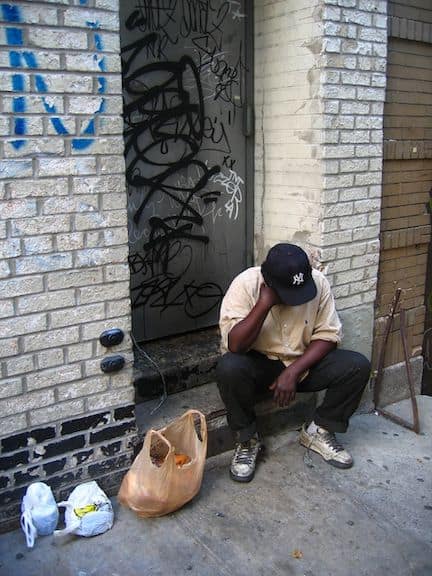Structural Poverty
by CAPP-USA

Structural poverty and Catholic social teaching
What is Structural Poverty?
Structural poverty is poverty caused by circumstances beyond one’s control…when people do not have the means to enable themselves to take a place in society in an effective and dignified way – through no fault of their own.
These may include the mentally ill, the sick, the laid off, etc. or, in lesser developed countries, those living in failed states. Structural poverty may even be caused by circumstances of culture, childhood, even racism.
Does the “System” work against some?
Structural poverty is particularly egregious for “those living in conditions opposed to human dignity: those who lack basic rights and needs such as food, water, hygiene, work and the opportunity to develop and grow culturally”. (Pope Francis, 2)
Here, poverty becomes a self-fulfilling loop where one is “without faith, without support, without hope” (Pope Francis, 2) unable to become the “chief architect of his own success or failure.” (Pope St. Paul VI, 15)
Indeed, “[i]n many countries globalization has meant a hastened deterioration of…cultural roots and the invasion of ways of thinking and acting proper to other cultures which are economically advanced but ethically debilitated.” (Pope Francis, 62)
A Solution – Catholic Social Teaching
“The sharing of goods and resources, from which authentic development proceeds, is not guaranteed by merely technical progress and relationships of utility, but by the potential of love that overcomes evil with good”. (Pope Benedict XVI, 7)
“The risk for our time is that the de facto interdependence of people and nations is not matched by ethical interaction of consciences and minds that would give rise to truly human development.” (Pope Benedict XVI, 7)
Catholic social teaching “offers a powerful way of thinking about what the common good requires, and how structures in society can promote or undermine human well-being”. (Vincent Cardinal Nichols, Archbishop of Westminster)
Who is Responsible?
“It is all men who are called to further the development of human society as a whole.” (Pope St. Paul VI, 17)
Let’s examine how, and who, can begin to help overcome instances of structural poverty.
The Responsibility of the Rich
While “[e]veryone must lend a ready hand to this task,” (Pope St. Paul VI, 32), some shoulder a greater responsibility to correct structural poverty, “particularly those who can do most by reason of their education, their office, or their authority.” (Pope St. Paul VI, 32)
“The richer class has many ways of shielding itself, and stands less in need of help from the State; whereas the mass of the poor have no resources of their own to fall back on”. (Pope Leo XIII, 37)
“Those who are more influential, because they have a greater share of goods and common services, should feel responsible for the weaker and be ready to share with them”. (Pope St. John Paul II, 39)
So, “[c]onsiderations of justice and equity can at times demand that those in power pay more attention to the weaker members of society, since these are at a disadvantage when it comes to defending their own rights and asserting their legitimate interests.” (Pope St. John XXIII, 56)
The Responsibility of the Poor
The poor have responsibilities too.
“Every human life is called to some task by God. Endowed with intellect and free will, each man is responsible for his self-fulfillment…he is the chief architect of his own success or failure.” (Pope St. Paul VI, 15)
“Those who are weaker…should not adopt a purely passive attitude or one that is destructive of the social fabric, but, while claiming their legitimate rights, should do what they can for the good of all.” (Pope St. John Paul II, 39)
“The pursuit of life’s necessities is quite legitimate; hence we are duty-bound to do the work which enables us to obtain them: ‘If anyone is unwilling to work, do not let him eat.’” (Pope St. Paul VI, 18)
“Utilizing only his talent and willpower, each man can grow in humanity, enhance his personal worth, and perfect himself.” (Pope St. Paul VI, 15)
My Responsibility
While solutions and actions will differ by the type of poverty: material, moral or spiritual and level of analysis (local, state, national and international) addressing structural poverty will take personal conversion, courage, and structural change.
This “involves, above all, a moral value which men and women of faith recognize as a demand of God’s will, the only true foundation of an absolutely binding ethic.” (Pope St. John Paul II, 38)
“We need to broaden our perspective…We need to grow in a solidarity which ‘would allow all peoples to become the artisans of their destiny’, since ‘every person is called to self-fulfillment.’” (Pope Francis, 190)
Ultimately, it is Spiritual
“The greatest service to development, then, is a Christian humanism…Openness to God makes us open towards our brothers and sisters and towards an understanding of life as a joyful task to be accomplished in a spirit of solidarity.” (Pope Benedict XVI, 78)





